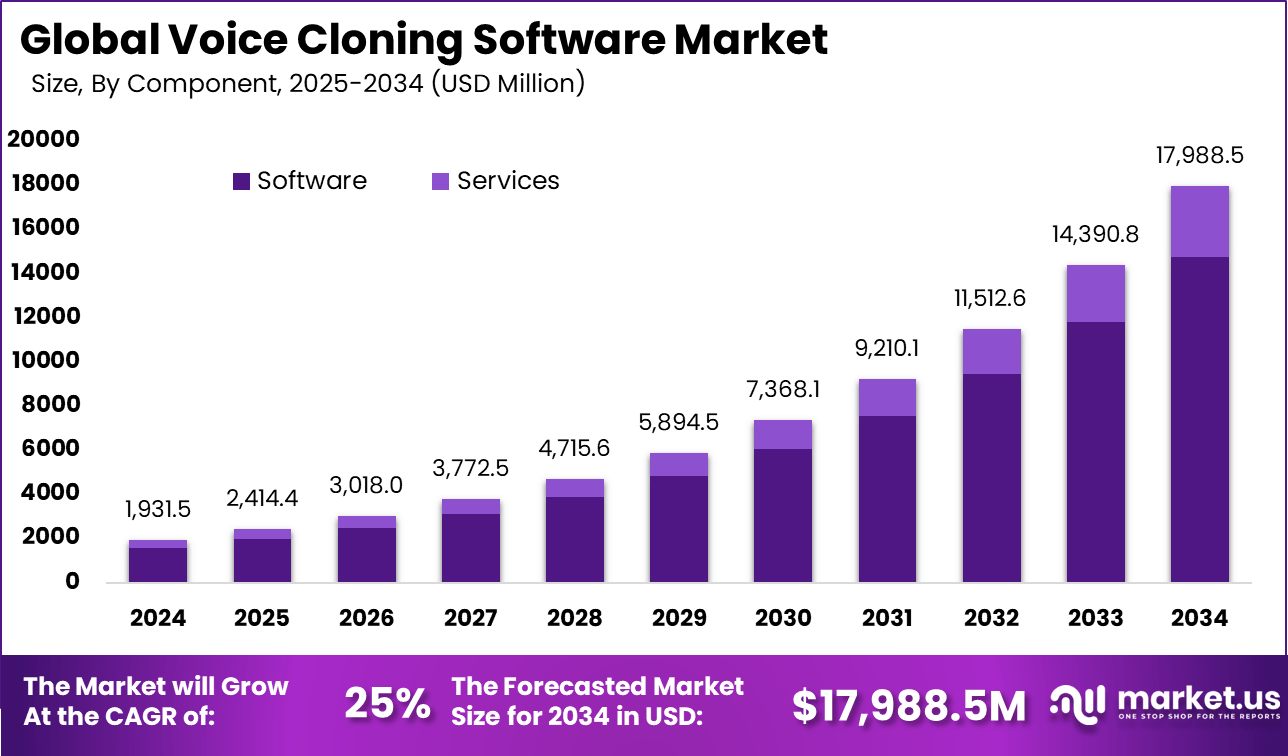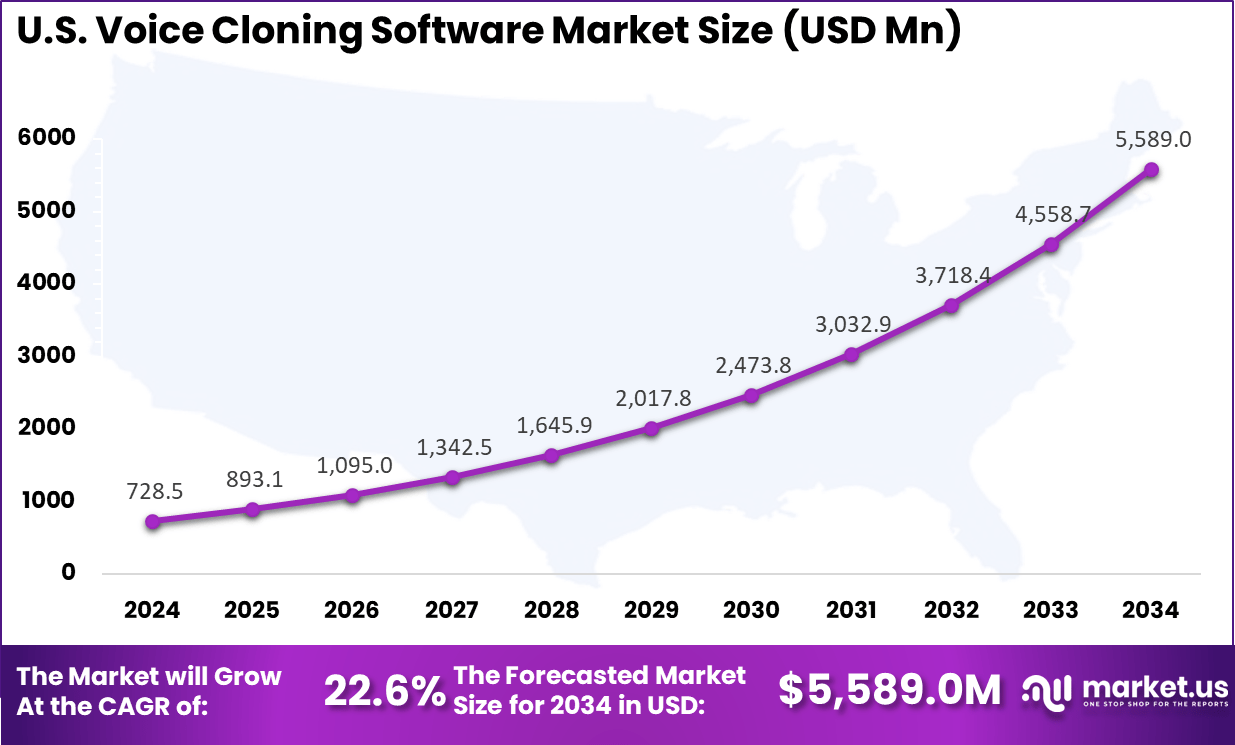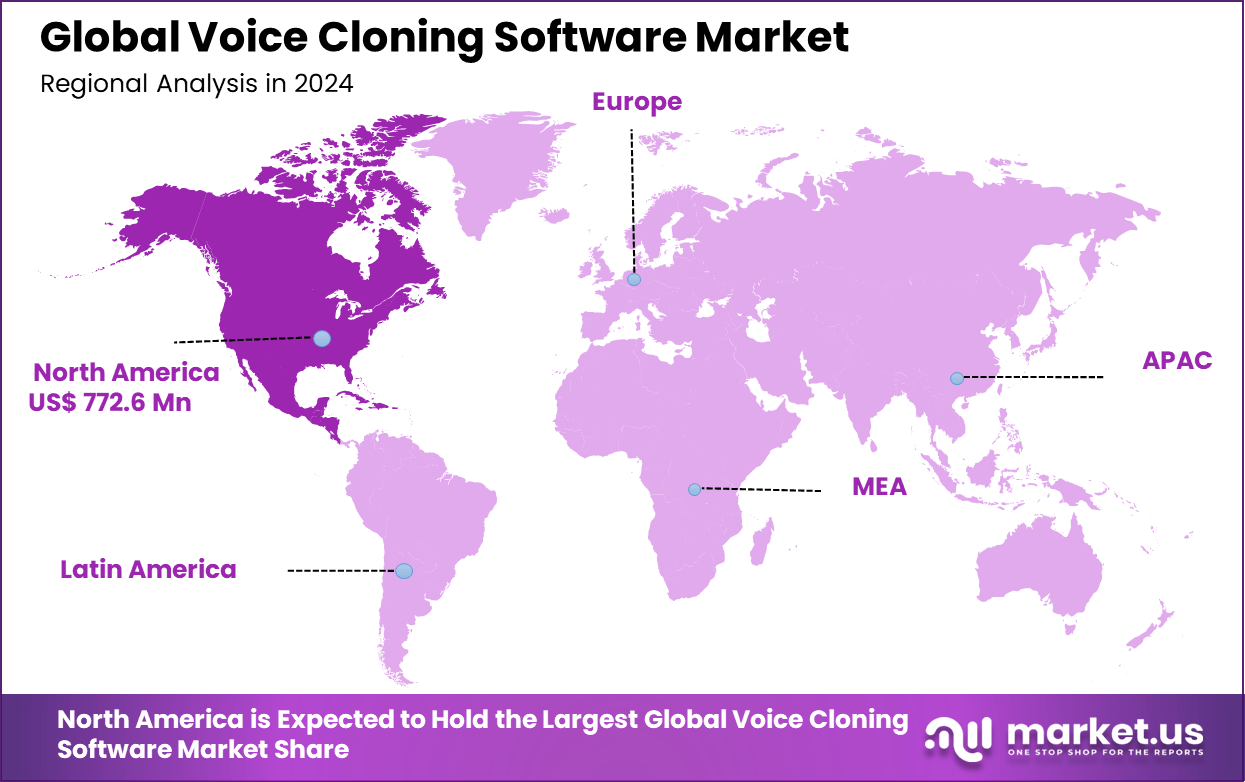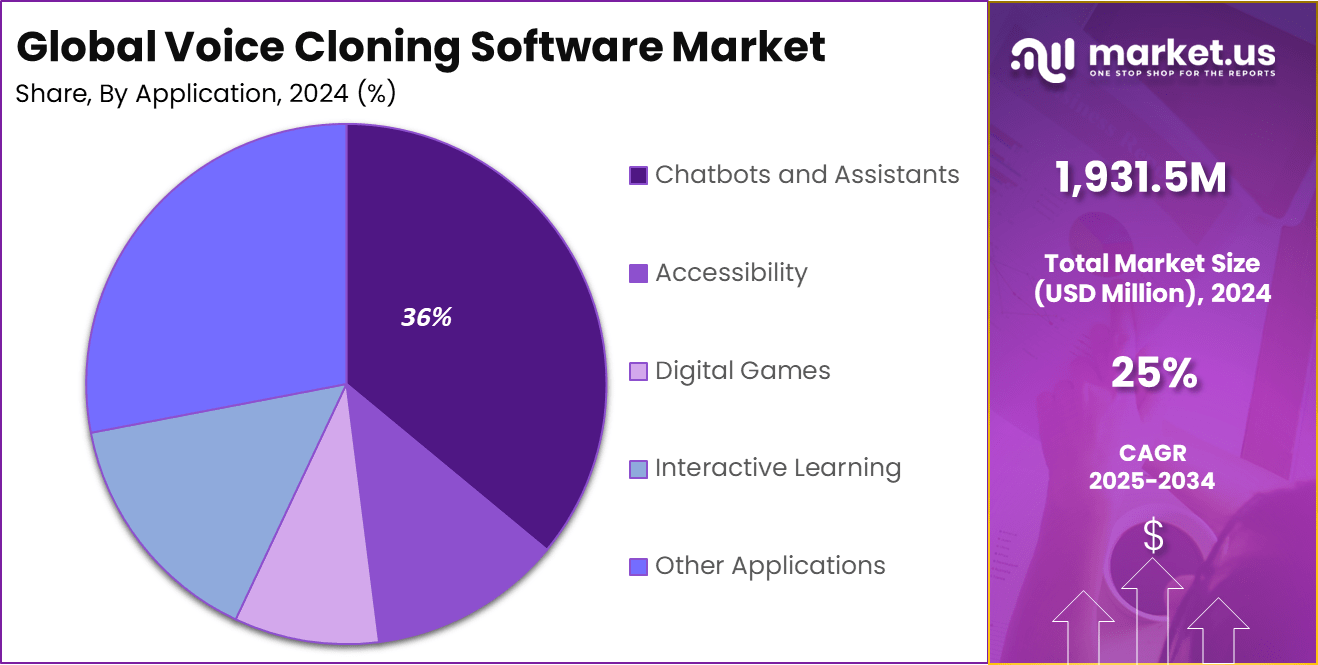Global Voice Cloning Software Market Size, Share, Industry Analysis Report By Component (Software, Services), By Application (Chatbots and Assistants, Accessibility, Digital Games, Interactive Learning, Other Applications), By Industry Vertical (Healthcare and Life Sciences, Education, Telecom, BFSI, Travel and Hospitality, Media & Entertainment, Other Industry Verticals), By Regional Analysis, Global Trends and Opportunity, Future Outlook By 2025-2034
- Published date: Oct. 2025
- Report ID: 160786
- Number of Pages: 233
- Format:
-
keyboard_arrow_up
Quick Navigation
Report Overview
The Global Voice Cloning Software Market size is expected to be worth around USD 17,988.5 million by 2034, from USD 1,931.5 million in 2024, growing at a CAGR of 25% during the forecast period from 2025 to 2034. In 2024, North America held a dominant market position, capturing more than a 40% share, holding USD 772.6 million in revenue.
Voice cloning software refers to AI-based systems that replicate a person’s voice using audio samples, enabling generation of new speech in that voice. The market has moved beyond academic experiments into commercial applications: content creation, accessibility, virtual assistants, media, and gaming are among early adopters. Growth is accelerating, driven by improvements in deep learning models, reduction in required sample size, and demand for personalized digital audio.

Top driving factors for the market include the rising need for hyper-personalized content, rapid improvement in deep learning models, and widespread deployment in voice-based AI assistants and virtual agents. Increasing demand from audiobook narration, podcasting, and gaming industries is notable, with voice cloning allowing scalable, cost-effective production of audio materials that sound natural and expressive.
According to Market.us, The global AI voice cloning market is projected to reach approximately USD 25.6 billion by 2033, up from USD 2.1 billion in 2023. This growth corresponds to a compound annual growth rate of 28.4% over the forecast period from 2024 to 2033. Additionally, the growth of digital customer interactions, such as chatbots and virtual assistants, fuels adoption, as businesses seek to enhance user experience with consistent and relatable synthetic voices.
For instance, in May 2025, Resemble AI made a groundbreaking move by open-sourcing its voice cloning model, Chatterbox. This initiative allows developers and organizations to access and customize the voice cloning technology, fostering innovation and accelerating the integration of voice synthesis in various applications.
Top Market Takeaway
- By component, software dominates with 82%, reflecting its central role in driving voice cloning applications.
- By application, chatbots and assistants lead with 36%, fueled by demand for conversational AI and virtual customer support.
- By industry vertical, healthcare and life sciences account for 28%, leveraging voice cloning for patient engagement and accessibility tools.
- North America holds 40%, supported by strong AI innovation ecosystems and enterprise adoption.
- The US market reached USD 728.5 million and is expanding at a robust CAGR of 22.6%, underscoring rapid growth in AI-driven speech technologies.
Investment and Business benefits
Investment opportunities abound given the expanding use cases and increasing technology maturity. Ventures focusing on voice cloning APIs with features like emotional modulation, speaker identification, and multi-language support attract developer interest for integration into broader AI solutions.
Healthcare applications, particularly multilingual services, represent key growth areas supported by pilot projects in telemedicine and patient care automation. Meanwhile, ethical AI and data privacy solutions present niches for investment, responding to rising regulatory demands to ensure secure, consensual use of biometric voice data.
Business benefits of voice cloning extend to enhanced productivity, personalized marketing, and accessibility improvements. Custom voice content accelerates production cycles, allowing creators and enterprises to generate realistic audio swiftly, which can be crucial for time-sensitive campaigns or training updates.
Personalization fosters deeper customer engagement, with individualized voice interactions tailored to preferences and emotional cues. Accessibility features powered by voice cloning assist users with disabilities, broadening market reach and complying with inclusive design standards.
U.S. Market Size
The market for Voice Cloning Software within the U.S. is growing tremendously and is currently valued at USD 728.5 million, the market has a projected CAGR of 22.6%. The market is growing tremendously due to the country’s leadership in technological innovation and the rapid adoption of AI-driven solutions across various industries.
The increasing demand for personalized customer experiences, especially in sectors like e-commerce, entertainment, and healthcare, is a key driver. Additionally, the U.S. boasts a strong tech ecosystem, with companies investing heavily in AI research and development, further accelerating the growth of voice cloning technologies for applications such as virtual assistants, gaming, and content creation.
For instance, In April 2024, OpenAI launched a new voice cloning tool that reinforced the U.S. dominance in the voice cloning software market. The tool enables users to create highly realistic voice replicas, showcasing OpenAI’s leadership in AI-driven voice technologies and strengthening the nation’s role as a global center for advanced AI innovation.

In 2024, North America held a dominant market position in the Global Voice Cloning Software Market, capturing more than a 40% share, holding USD 772.6 million in revenue. This dominance is due to its strong technological infrastructure, leading AI research capabilities, and early adoption of advanced technologies.
The region’s robust presence of tech giants and startups driving innovation in AI, deep learning, and natural language processing has accelerated the development and application of voice cloning. Additionally, the high demand for personalized services in sectors like entertainment, customer support, and healthcare further bolstered leadership.
For instance, in January 2024, ElevenLabs, an AI voice cloning startup, was valued at $1.1 billion, solidifying its position as a key player in the North American voice cloning software market. This valuation underscores North America’s dominance in the global voice cloning space, driven by significant investments and the presence of innovative startups.

Component Analysis
In 2024, The Software segment held a dominant market position, capturing an 82% share of the Global Voice Cloning Software Market. This dominance is due to the growing demand for AI-driven software solutions that enable accurate, scalable, and customizable voice cloning applications.
Software platforms allow businesses to integrate voice cloning into various systems, including virtual assistants, customer service automation, and media production, offering flexibility and ease of use. Continuous advancements in machine learning and natural language processing further enhance its growth.
For Instance, in March 2025, ElevenLabs, a leading U.S.-based AI voice cloning company, showcased its cutting-edge technology in the Modi Lex Fridman Podcast, where its AI was used for Hindi-English dubbing. This advancement highlights the growing influence of voice cloning software developed by U.S. companies, particularly in the fields of media and localization.
Application Analysis
In 2024, the Chatbots and Assistants segment held a dominant market position, capturing a 36% share of the Global Voice Cloning Software Market. This dominance is due to the growing adoption of voice-powered AI assistants in customer service, e-commerce, and personal devices.
Voice cloning enhances the user experience by providing more natural, personalized, and engaging interactions. As businesses increasingly integrate AI-driven chatbots and assistants to improve efficiency, automate processes, and offer seamless customer support, the demand for voice cloning technology continues to rise.
For instance, in March 2025, Sesame, the startup behind the viral virtual assistant Maya, released its base AI model designed to enhance voice cloning and virtual assistant capabilities. This model allows Maya to generate highly realistic, personalized voices that adapt to individual preferences. By leveraging voice cloning software, Sesame aims to improve the user experience in virtual assistants, making them more intuitive and responsive.

Industry Vertical Analysis
In 2024, The Healthcare and Life Sciences segment held a dominant market position, capturing a 28% share of the Global Voice Cloning Software Market. This dominance is due to the increasing demand for personalized healthcare solutions and accessibility features, such as voice cloning for patients with speech impairments.
Voice cloning technology is also being used for creating virtual health assistants, automating patient interactions, and improving telemedicine experiences, driving growth in this sector. The technology’s potential to enhance patient care and accessibility is fueling its adoption in healthcare.
For Instance, In March 2025, Microsoft introduced Dragon Copilot, the healthcare industry’s first unified voice AI assistant aimed at streamlining clinical documentation and automating administrative tasks. By combining voice cloning and AI-powered speech recognition, it enables clinicians to interact more efficiently with electronic health records and enhances both workflow efficiency and patient care quality.
Emerging Trends
The emerging trends in voice cloning underscore growing customization and emotional expressiveness in synthetic voices. There is a notable shift toward neural network-based models that improve voice naturalness and responsiveness.
The market also sees an increased focus on ethical deployment and securing voice data to counter misuse like deepfake fraud, underscored by a reported 27% rise in compliance spending in financial sectors. Additionally, integration with smart devices and real-time voice modulation for gaming and interactive media drives adoption, with interactive gaming showing a growth rate of 33.7% annually due to immersive voice experiences.
Growth Factors
Growth factors for voice cloning software include rapid advancements in speech synthesis and AI, increased demand for accessible AI-driven communication tools, and a rise in remote and virtual interactions globally. The expansion of voice-enabled smart home devices and AI in customer services has accelerated adoption.
Adoption statistics reveal that over 35% of companies offering machine learning services have incorporated voice cloning capabilities by 2023, reflecting the technology’s broadening commercial footprint. These drivers contribute to robust market expansion across sectors such as healthcare, where personalized synthetic voices improve patient care and accessibility.
Key Market Segments
By Component
- Software
- Cloud-based
- On-premises
- Services
- Professional Services
- Managed Services
By Application
- Chatbots and Assistants
- Accessibility
- Digital Games
- Interactive Learning
- Other Applications
By Industry Vertical
- Healthcare and Life Sciences
- Education
- Telecom
- BFSI
- Travel and Hospitality
- Media & Entertainment
- Other Industry Verticals
Regional Analysis and Coverage
- North America
- US
- Canada
- Europe
- Germany
- France
- The UK
- Spain
- Italy
- Russia
- Netherlands
- Rest of Europe
- Asia Pacific
- China
- Japan
- South Korea
- India
- Australia
- Singapore
- Thailand
- Vietnam
- Rest of Latin America
- Latin America
- Brazil
- Mexico
- Rest of Latin America
- Middle East & Africa
- South Africa
- Saudi Arabia
- UAE
- Rest of MEA
Drivers
Technological Advancements in AI and Deep Learning
Advancements in AI, particularly deep neural networks and generative adversarial networks (GANs), have revolutionized voice cloning technology. These models enable the replication of voices with high accuracy, capturing nuances such as tone, pitch, and speech patterns.
Voice cloning has become more natural and accessible, making it applicable across various sectors. The ability to generate lifelike voices is transforming industries like entertainment, customer service, and personalized AI applications.
For instance, in April 2025, Mango AI launched a free voice replication tool, making AI-powered voice cloning technology more accessible to the public. This tool allows users to create accurate voice clones without needing expensive software or specialized knowledge. By democratizing access to voice cloning technology, Mango AI aims to empower creators, businesses, and individuals to personalize voice experiences.
Restraint
Ethical and Privacy Concerns
Voice cloning raises significant ethical and privacy concerns, especially regarding consent and misuse. Cloned voices can be exploited for malicious purposes such as fraud, identity theft, or creating deceptive deepfakes.
These voices can be impersonated and pose serious risks to individuals’ security and privacy. As the technology progresses, ensuring its ethical use and protecting personal data will be crucial to prevent harmful consequences and maintain public trust in voice cloning applications.
For instance, In July 2025, OpenAI CEO Sam Altman cautioned against the growing risks of fraud associated with AI voice cloning technologies. As voice replication becomes increasingly sophisticated, concerns over ethics and privacy intensify. The capability to mimic voices with high accuracy raises the threat of identity theft, scams, and deepfake audio, posing serious risks to both individuals and organizations.
Opportunities
Advancements in Real-time, Multilingual Voice Synthesis
The development of real-time, multilingual voice synthesis opens new opportunities across several industries, including gaming, healthcare, and education. In gaming, real-time voice synthesis can enhance immersive experiences by providing diverse, multilingual voices.
In healthcare, it can improve accessibility for patients with speech impairments. In education, it facilitates personalized learning, breaking language barriers, and enabling global content delivery. These advancements present immense growth potential, driving the adoption of voice cloning across multiple sectors.
For instance, in July 2025, NVIDIA announced significant advancements in real-time, multilingual voice synthesis through its Riva TTS (Text-to-Speech) platform. The technology enhances voice cloning capabilities by enabling highly accurate, human-like speech in multiple languages, allowing for seamless communication across linguistic barriers.
Challenges
Regulatory and Legal Challenges
Voice cloning technology faces a major challenge due to the absence of clear and comprehensive regulations. Without established guidelines, there are concerns regarding misuse, accountability, and privacy violations.
This regulatory ambiguity may slow the adoption of voice cloning, as businesses and users remain hesitant due to potential legal risks. Clear, consistent legal frameworks are essential to ensure the technology’s ethical application and safeguard against its misuse, fostering widespread acceptance and growth in the market.
For instance, in November 2024, discussions around AI regulation gained traction, particularly in light of Donald Trump’s victory and its potential impact on AI governance. As the U.S. government grapples with how to regulate advanced AI technologies like voice cloning, there are growing concerns over the misuse of AI-driven tools, including deepfakes and identity theft.
Key Players Analysis
The Voice Cloning Software Market is led by global technology firms such as IBM Corporation, Google LLC, Microsoft Corporation, and Amazon Web Services, Inc. These companies offer AI-driven voice synthesis platforms that support natural-sounding speech generation, multi-language capabilities, and integration with enterprise applications. Their solutions are widely adopted for virtual assistants, accessibility tools, and media production.
Specialized software providers including LumenVox, iSpeech, Inc., Descript, CandyVoice, and CereProc Ltd. focus on customizable voice models, real-time cloning, and text-to-speech accuracy. Their platforms serve media, entertainment, and customer service sectors, enabling businesses to create personalized audio experiences efficiently.
Emerging and niche players such as Acapela Group, Cepstral, Ispeech Inc., Resemble AI, and VocaliD Inc. provide advanced features such as emotional tone replication, voice personalization, and multilingual support. A growing number of other key players continue to innovate, expanding market adoption in e-learning, healthcare, and content creation industries.
Top Key Players in the Market
- LumenVox
- iSpeech, Inc.
- IBM Corporation
- AT&T Inc.
- Descript
- Google LLC
- CandyVoice
- Amazon Web Services, Inc.
- CereProc Ltd.
- Microsoft Corporation
- Acapela Group
- Cepstral
- Ispeech Inc.
- Resemble AI
- VocaliD Inc.
- Other Key Players
Recent Developments
- In April 2024, Resemble AI successfully raised $8 million in funding. This investment will help the company expand its AI-driven voice cloning technology, allowing for more advanced and customizable voice solutions. The funding is expected to accelerate the development of new features and enhance the company’s position in the growing market for voice synthesis and AI-powered voice applications, particularly in industries like media, entertainment, and customer service.
- In February 2024, Descript released a series of exciting updates, enhancing its voice cloning capabilities. The company introduced improved stock voices and an enhanced Quick Recorder, which streamlines the process of recording and editing voice content. These updates make it easier for users to create lifelike, personalized voice recordings and improve workflow efficiency, particularly for podcasters, content creators, and media professionals.
Report Scope
Report Features Description Market Value (2024) USD 1,931.5 Mn Forecast Revenue (2034) USD 17,988 Mn CAGR(2025-2034) 25% Base Year for Estimation 2024 Historic Period 2020-2023 Forecast Period 2025-2034 Report Coverage Revenue forecast, AI impact on Market trends, Share Insights, Company ranking, competitive landscape, Recent Developments, Market Dynamics and Emerging Trends Segments Covered By Component (Software, Services), By Application (Chatbots and Assistants, Accessibility, Digital Games, Interactive Learning, Other Applications), By Industry Vertical (Healthcare and Life Sciences, Education, Telecom, BFSI, Travel and Hospitality, Media & Entertainment, Other Industry Verticals) Regional Analysis North America – US, Canada; Europe – Germany, France, The UK, Spain, Italy, Russia, Netherlands, Rest of Europe; Asia Pacific – China, Japan, South Korea, India, New Zealand, Singapore, Thailand, Vietnam, Rest of Latin America; Latin America – Brazil, Mexico, Rest of Latin America; Middle East & Africa – South Africa, Saudi Arabia, UAE, Rest of MEA Competitive Landscape LumenVox, iSpeech, Inc., IBM Corporation, AT&T Inc., Descript, Google LLC, CandyVoice, Amazon Web Services, Inc., CereProc Ltd., Microsoft Corporation, Acapela Group, Cepstral, iSpeech Inc., Resemble AI, VocaliD Inc., Other Key Players Customization Scope Customization for segments, region/country-level will be provided. Moreover, additional customization can be done based on the requirements. Purchase Options We have three license to opt for: Single User License, Multi-User License (Up to 5 Users), Corporate Use License (Unlimited User and Printable PDF)  Voice Cloning Software MarketPublished date: Oct. 2025add_shopping_cartBuy Now get_appDownload Sample
Voice Cloning Software MarketPublished date: Oct. 2025add_shopping_cartBuy Now get_appDownload Sample -
-
- LumenVox
- iSpeech, Inc.
- IBM Corporation
- AT&T Inc.
- Descript
- Google LLC
- CandyVoice
- Amazon Web Services, Inc.
- CereProc Ltd.
- Microsoft Corporation
- Acapela Group
- Cepstral
- Ispeech Inc.
- Resemble AI
- VocaliD Inc.
- Other Key Players













